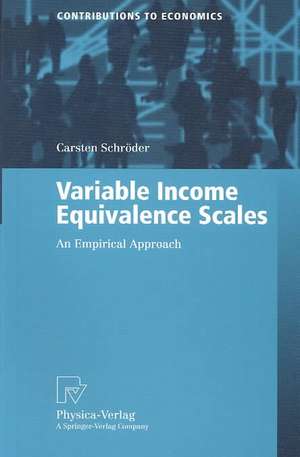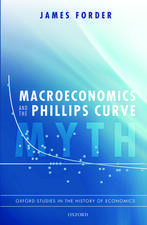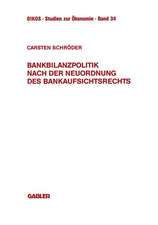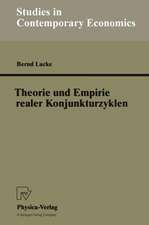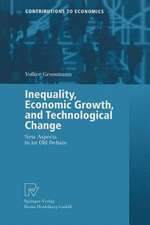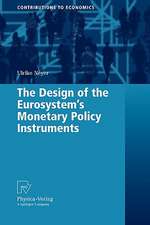Variable Income Equivalence Scales: An Empirical Approach: Contributions to Economics
Autor Carsten Schröderen Limba Engleză Paperback – 18 mar 2004
Din seria Contributions to Economics
- 18%
 Preț: 1001.81 lei
Preț: 1001.81 lei -
 Preț: 90.83 lei
Preț: 90.83 lei - 15%
 Preț: 649.06 lei
Preț: 649.06 lei - 18%
 Preț: 1109.92 lei
Preț: 1109.92 lei - 24%
 Preț: 657.09 lei
Preț: 657.09 lei - 18%
 Preț: 976.54 lei
Preț: 976.54 lei - 17%
 Preț: 361.03 lei
Preț: 361.03 lei - 18%
 Preț: 1027.83 lei
Preț: 1027.83 lei -
 Preț: 283.93 lei
Preț: 283.93 lei - 15%
 Preț: 644.95 lei
Preț: 644.95 lei - 15%
 Preț: 638.24 lei
Preț: 638.24 lei -
 Preț: 394.29 lei
Preț: 394.29 lei - 15%
 Preț: 636.80 lei
Preț: 636.80 lei - 15%
 Preț: 637.78 lei
Preț: 637.78 lei - 18%
 Preț: 723.69 lei
Preț: 723.69 lei - 15%
 Preț: 635.47 lei
Preț: 635.47 lei - 15%
 Preț: 634.00 lei
Preț: 634.00 lei -
 Preț: 392.75 lei
Preț: 392.75 lei -
 Preț: 383.33 lei
Preț: 383.33 lei - 15%
 Preț: 637.28 lei
Preț: 637.28 lei - 15%
 Preț: 636.80 lei
Preț: 636.80 lei - 18%
 Preț: 950.96 lei
Preț: 950.96 lei - 15%
 Preț: 634.68 lei
Preț: 634.68 lei -
 Preț: 387.38 lei
Preț: 387.38 lei - 15%
 Preț: 647.27 lei
Preț: 647.27 lei - 15%
 Preț: 636.63 lei
Preț: 636.63 lei - 15%
 Preț: 639.73 lei
Preț: 639.73 lei -
 Preț: 385.62 lei
Preț: 385.62 lei - 15%
 Preț: 641.85 lei
Preț: 641.85 lei - 20%
 Preț: 649.60 lei
Preț: 649.60 lei - 15%
 Preț: 641.71 lei
Preț: 641.71 lei -
 Preț: 387.96 lei
Preț: 387.96 lei - 15%
 Preț: 645.47 lei
Preț: 645.47 lei -
 Preț: 385.08 lei
Preț: 385.08 lei - 15%
 Preț: 646.62 lei
Preț: 646.62 lei -
 Preț: 383.33 lei
Preț: 383.33 lei - 15%
 Preț: 638.43 lei
Preț: 638.43 lei -
 Preț: 381.21 lei
Preț: 381.21 lei - 15%
 Preț: 642.51 lei
Preț: 642.51 lei - 15%
 Preț: 637.78 lei
Preț: 637.78 lei - 15%
 Preț: 641.71 lei
Preț: 641.71 lei -
 Preț: 384.70 lei
Preț: 384.70 lei -
 Preț: 379.86 lei
Preț: 379.86 lei -
 Preț: 378.34 lei
Preț: 378.34 lei -
 Preț: 384.70 lei
Preț: 384.70 lei -
 Preț: 388.52 lei
Preț: 388.52 lei - 15%
 Preț: 641.71 lei
Preț: 641.71 lei -
 Preț: 381.00 lei
Preț: 381.00 lei - 15%
 Preț: 644.95 lei
Preț: 644.95 lei -
 Preț: 386.00 lei
Preț: 386.00 lei
Preț: 381.43 lei
Nou
Puncte Express: 572
Preț estimativ în valută:
72.99€ • 78.05$ • 60.85£
72.99€ • 78.05$ • 60.85£
Carte tipărită la comandă
Livrare economică 18 aprilie-02 mai
Preluare comenzi: 021 569.72.76
Specificații
ISBN-13: 9783790801835
ISBN-10: 3790801836
Pagini: 180
Ilustrații: VIII, 168 p.
Dimensiuni: 155 x 235 x 9 mm
Greutate: 0.26 kg
Ediția:Softcover reprint of the original 1st ed. 2004
Editura: Physica-Verlag HD
Colecția Physica
Seria Contributions to Economics
Locul publicării:Heidelberg, Germany
ISBN-10: 3790801836
Pagini: 180
Ilustrații: VIII, 168 p.
Dimensiuni: 155 x 235 x 9 mm
Greutate: 0.26 kg
Ediția:Softcover reprint of the original 1st ed. 2004
Editura: Physica-Verlag HD
Colecția Physica
Seria Contributions to Economics
Locul publicării:Heidelberg, Germany
Public țintă
ResearchCuprins
1.1 A Brief Overview.- 1.2 Objective of the Thesis.- 1.3 Structure of the Thesis.- Equivalence-Scale Measurement.- 2.1 Expert Approaches.- 2.2 Economic Approaches.- 2.3 Survey Approaches.- The Potential Dependence of Equivalence Scales on Income.- 3.1 Plausibility of Constant Equivalence Scales.- 3.2 Empirical Picture.- 3.3 Conclusion.- Equivalence Scales, Employment and Household Production.- 4.1 The Earnings-Capacity Argument.- 4.2 The Household Production Argument.- 4.3 Conclusion.- A New Consensual Approach.- 5.1 Introduction.- 5.2 The New Survey Design.- 5.3 On the Choice of Income as an Indicator of Well-Being.- 5.4 Validity and Reliability: Test Methods.- Survey I.- 6.1 Motivation and Outline.- 6.2 Questionnaire Design.- 6.3 Breakdown of the Samples.- 6.4 Regression Model, Notation, and Data Preparation.- 6.5 Country-specific Regression Analysis.- 6.6 Cross-country Differences.- 6.7 Descriptive Analysis.- 6.8 Validity.- 6.9 Reliability.- Survey II.- 7.1 Motivation and Outline.- 7.2 On Internet Surveys.- 7.3 Questionnaire Design.- 7.4 Breakdown of the Samples.- 7.5 Regression Model, Notation, and Data Preparation.- 7.6 Country-specific Regression Analysis.- 7.7 Cross-country Differences.- 7.8 Descriptive Analysis.- 7.9 Validity.- 7.10 Reliability.- Conclusion.- List of Symbols.- List of Figures and Tables.- References.
Textul de pe ultima copertă
The book presents a new survey method for assessing equivalence scales. While previous surveys have frequently been accused of providing data which are substantially biased by respondents' personal characteristics and other subjective biases the new method keeps bias to an absolute minimum. Another key feature is that the derived data adds information as to the impact of two key variables on equivalence scales: income and the number of employed household members. In contrast to the standard ‘independence of base assumption’, the equivalence scales presented are inversely related to the income level of the reference household (a single adult), and increase in the number of employed household members.
Caracteristici
Includes supplementary material: sn.pub/extras
